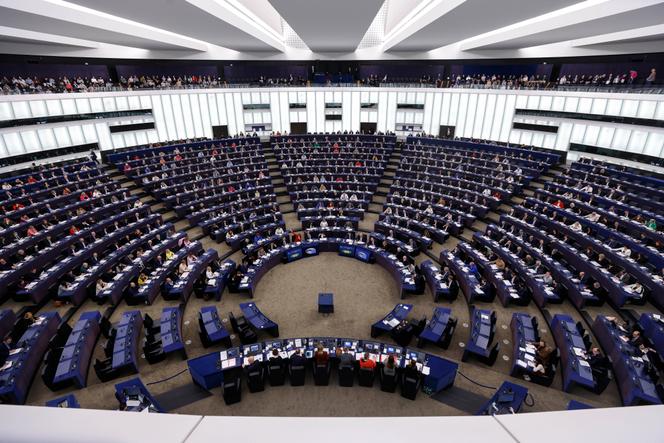


Tuesday, July 16, will be the official first day in office for the 720 men and women elected on June 9 to the European Parliament. Many of them – about 46% – are not serving their first term. But the others will, on this occasion, discover the building in Strasbourg that hosts MEPs 12 times a year.
Over the past few days, the newcomers have had the time to get used to life in Brussels, where they will spend most of their time over the next five years. They have met their colleagues, started to settle in and discussed what lies ahead. At the "Welcome Village," set up next to the MEPs' restaurant on June 10, a dozen stands were waiting to help them settle in.
They were photographed, told how much they would be paid, and the budget available to hire an assistant. They were informed of their health insurance entitlements, and of the help they would receive from the administration in terms of communication and interpretation.
But it's on Tuesday, in Strasbourg, that the new legislature was set to be launched and the elected members would officially take up their duties. Philippe Lamberts, the former president of the Greens group, who chose not to stand for re-election after three terms, still remembers that other Tuesday in July, 15 years ago, when he entered the chamber for the first time, early in the morning, with only the ushers present. "I sat down in my seat, 566, with an incredible feeling. A few days earlier, I'd been an executive at IBM, and here I was, representing millions of Europeans," he remembered.
As the most populous country in the European Union (EU), the Germans have the most seats in Parliament, with 96 representatives. France comes second, with 81 representatives. Through the Rassemblement National (RN), France has the largest delegation in the European Parliament: With 30 MEPs, the far-right party outnumbers Germany's CDU-CSU by one member. At the other end of the spectrum, Cyprus, Malta and Luxembourg each have just six seats.
Number of MEPs by parliamentary group
On July 15 2024
720 seats
A political group is made up of at least 23 members elected in at least seven member states
The Left
Group co-chairs: Manon Aubry (France, LFI), Martin Schirdewan (Germany, Die Linke)
13 countries
Including:
- La France insoumise - 9 MEPs (France)
- 5-Star Movement - 8 MEPs (Italy)
- Syriza - 4 MEPs (Greece)
- Die Linke - 3 MEPs (Germany)
Social Democrats (S&D)
Group chair: Iratxe Garcia Pérez (Spain, PSOE)
25 countries
Including:
- Parti Socialiste-Place publique - 13 MEPs - Raphaël Glucksmann (France)
- SPD - 14 MEPs (Germany)
- PSOE - 20 MEPs (Spain)
- Democratic Party - 21 MEPs (Italy)
Greens/A
Group co-chairs: Bas Eickhout (Netherlands, GroenLinks-PvdA), Terry Reintke (Germany, Die Grünen)
17 countries
Including:
- EELV - 5 MEPs - Marie Toussaint (France)
- Die Grünen - 12 MEPs (Germany)
Renew
Group chair: Valérie Hayer (France, Renaissance)
20 countries
Including:
- Ensemble* - 13 MEPs - Pascal Canfin, Nathalie Loiseau (France)
* Renaissance-MoDem-Horizons-UDI-Parti Radica
European People's Party (EPP)
Group chair: Manfred Weber (Germany, CSU)
27 countries
Including:
- Les Républicains - 6 MEPs - François-Xavier Bellamy, vice-président (France)
- CDU-CSU - 29 MEPs (Germany)
- Civic Coalition - 21 MEPs (Poland)
- People's Party - 22 MEPs (Spain)
European Conservatives and Reformists (ECR)
Co-chairs: Nicola Procaccini (Italy, Fratelli d'Italia), Ryszard Legutko (Poland, PiS)
18 countries
Including:
- Fratelli d’Italia - 24 MEPs (Italy) - Giorgia Meloni's party
- Reconquête ! ** - 4 MEPs - Marion Maréchal, Guillaume Peltier, Nicolas Bay (France)
- PiS - 20 MEPs (Poland)
** MEPs elected on June 9 under the Reconquête label, since excluded.
Patriots for Europe
Chair: Jordan Bardella (France, Rassemblement national)
12 countries
New group including:
- Rassemblement national - 30 MEPs - Thierry Mariani, Fabrice Leggeri,Gilles Pennelle
- Fidesz - 11 MEPs (Hungary) - Viktor Orban's party
- Ligue - 8 MEPs (Italy) - party of Matteo Salvini
- Vox - 6 MEPs (Spain)
Europe of Sovereign Nations
Co-chairs: René Aust (Germany, AfD), Stanislaw Tyszka (Poland, Confederation)
8 countries
New group including :
- Reconquête ! - 1 MEP - Sarah Knafo (France)
- AfD - 14 MEPs (Germany)
Le Monde infographic: Sylvie Gittus
Sources : European Parliament, French Interior Ministry
In this Parliament, men remain in the majority, representing 60% of members, as it was after the 2019 European elections. There are no women in the Cypriot delegation. In Italy and Germany, women account for a third of members. Generally speaking, northern countries give more space to women: In Finland and Sweden, over 60% of members are women. France is almost equal (49%).
On the evening of June 9, when the results of the European elections were announced, negotiations began, with each political group trying to attract new parties so as to have as many members as possible. Speaking time, committee chairs and other positions of power within the assembly, as well as a group's financial resources, all depend on group size.
You have 65.79% of this article left to read. The rest is for subscribers only.
